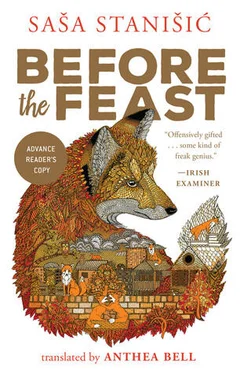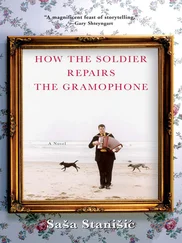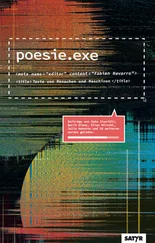On, and now the chickens at last, beating their wings violently, singing, scratching, just a moment, just a moment, the eggs, there, there and there, the first breaks, it isn’t easy in the confusion, just a moment, there’s a lot of noise, she kills one chicken, tears its head off to make it a little quieter, the second egg, careful now, she takes it behind her teeth between her tongue and her gums, it’s all right! There it is, it breaks, yolk, lovely yolk, with yolk in her mouth she kills another chicken, impatient now, the last egg, the last egg gets trodden underfoot, who, the vixen looks round, the chickens are wagging their heads, and then — then the rooster wants to fight, the rooster pecks the back of her neck hard, deep, and blood, her own blood, runs, stings, the vixen has dust in her eye, keep calm, out of here, her right paw hurts, the back of her neck, but most of all her eye, it isn’t dust, the large fowl is pecking at her, out, out, zigzag, she’s in flight now, this is the vixen in flight, her eye hurts, bothers her, she climbs on the wooden henhouse, heaves herself over the woven metal, lands on her injured paw again, her mouth full of feathers, yolk, and the night is full of blood, on such a night as this, the night is blind in one eye.
ANNA IS SHIVERING ON TOP OF THE WALL. THE rain has slackened off, but the wind is stronger. The trick of it, Herr Schramm explains, is to squint slightly, like with those colored 3-D pictures, and in the end you can make out a heart or a rocket in them. Anna doesn’t know about 3-D pictures, she knows about 3-D films and 3-D printers, and Herr Schramm is surprised that she doesn’t know about 3-D pictures, it’s not really a question of different generations.
But squinting doesn’t help — Anna still can’t make out the Güldenstein. “I thought,” she says, “it was only a fairy tale. A farmer, a donkey and a stone shining like gold. I think someone drowns in the end. The farmer?”
Herr Schramm is an upright military man with poor posture. Herr Schramm is so thirsty for a cigarette, so thirsty, and every second without one is a second in a hot desert of salt.
A bat swoops over the promenade.
The stone exists. Herr Schramm knows that, Herr Schramm doesn’t need to explain what he knows to the girl now. It lies in the water just off the little island with the barn on it. As children they used to go out to it on a wooden sledge, when there was thick ice over the lake. It was best at night, because they weren’t allowed to go out then.
“I didn’t know you came from here.”
It was best at night, because then the Güldenstein shone. And Herr Schramm, Lieutenant-Colonel, forester, pensioner, points out into the black dark as if there were something to be seen there.
Anna can’t see anything.
All the gold we’ll ever have touched in our lives, says Herr Schramm, was made in an exploding star. The Güldenstein shines like gold. Not by day, not in the sunlight. By day it looks like any other stone. But on starless nights. Herr Schramm looks at the clouds. Ologists of some kind came to see it. Geologists, biologists or suchlike.
“And what did they say?”
What would you expect? Algae, moss, parasites, fungi. At least: a ferryman once lived on the island with the barn on it. Not much is known about him today. He was just a ferryman. It’s known that he once didn’t want to work on the day of the Anna Feast. Day of rest. The times were hard enough, you wanted to drink and sing and not spend three hours going round the lake on foot and back by night. Half of them would never have arrived. Well, so they gave the ferryman a barrel of beer, and then he did it.
“Super story.”
Not the one that Herr Schramm wanted to tell. He wanted to tell the story of the light that the ferryman always carried with him, even by day. And after he had brought his last passenger ashore, he went back to his hut on the island and left a lonely little light burning all through the night.
“A lonely little light?” Anna giggles.
A lantern or some such thing. Listen, will you? People asked: why are you doing that? Who is that light going to guide? Why don’t you save your oil? They knew he wasn’t a rich man.
I always have a light to spare, the ferryman said. Without a light you’re nothing and no one. Only the light makes you human. Of course that’s just some sort of saying, but think about it.
Anna and Herr Schramm do think about it.
Anna says, “But it’s still not as great as all that.”
As a child Herr Schramm went out to the Güldenstein on the wooden sledge when the lake had a thick layer of ice on it. Preferably by night. He wasn’t supposed to, but he did all the same. Preferably with Imboden, with Hanno, with Eddie, and Anna’s grandpa was with them too.
Yes, so now you see. Now his granddaughter is suggesting to Herr Schramm that they could go over there together when the lake freezes.
Herr Schramm clears his throat. Turns to Anna. She has switched that stupid headlight on. For goodness’ sake, switch that thing off for a moment. No wonder Anna can’t see anything.
Anna does as he says.
Herr Schramm turns back to the lake. All those things that the Güldenstein is supposed to have been. A huge lump of gold. A treasure. A star in the sky of the black lake. A lighthouse for anyone in need of warning and guidance. Algae and moss. The downfall of the greedy farmer in the folk tale. A story of which Schramm knew, back then, that he would tell it to someone one day. Anna, listen: there’s no story. Once upon a time there was a ferryman who always had a light with him. And when he was dead a stone began to shine.
Once upon a time there was young Wilfried Schramm. He sat on a shining stone and smoked his first cigarette. Wasn’t very good at it. Shivered with cold and excitement. Bats rose from the islet and flew over the lake. At the time he thought, bats meandered . Not the right word for a bat, much too slow. And from the stone, Fürstenfelde and its lights, on a slant and long-drawn-out, looked like a huge ship that had run aground sometime and couldn’t float itself again. Generations of idiots on it who wouldn’t give up, and new idiots keep getting born and dying there too. Some do all right, some don’t.
Anna says nothing. Anna squints. Above the ash trees over there?
On average, the suicide rate is higher in countries with a good standard of living than in poorer countries. More men than women kill themselves everywhere. Except in China. On average the rate in the GDR was one and a half times higher than in the West. Herr Schramm can’t believe that was just to do with the GDR. More a question of tradition; look at the Rhineland where everyone is Catholic and hardly any of them kill themselves.
Herr Schramm believes in moss and algae, not reincarnation and magic. China, for goodness’ sake. Herr Schramm thinks it makes no difference whether you come from China or Fürstenfelde, whether you were a ferryman or a shipwrecked sailor in the past or now — for a while your light will shine. Shine ahead of you. Maybe shine for no one, maybe for someone. The Güldenstein.
Anna doesn’t have to get a clear view of Herr Schramm’s face to see it. The torrent of words that washed over his usual taciturnity surprised her. Now he’s brooding again. Tired. Maybe tired.
Now there are squelching steps in the mud, and a light coming closer. A broad shadow emerges from the darkness of the graveyard, a flashlight in its left hand, what is presumably a pistol in its right hand — unless it’s only a joke that a woman says, “Hands up!” to the old man and the young woman.
Presumably we now have two weapons here.
BE HEROIC
Learn to run fast, swim far, climb high (but be cautious), learn what is fitting for a woman and what is fitting for a man, and then do what you want to do. Learn (if you like) what you are told is not suitable for you.
Читать дальше












